Alexander 2.12
Alexander the Great (*356; r. 336-323): the Macedonian king who defeated his Persian colleague Darius III Codomannus and conquered the Achaemenid Empire. During his campaigns, Alexander visited a.o. Egypt, Babylonia, Persis, Media, Bactria, the Punjab, and the valley of the Indus. In the second half of his reign, he had to find a way to rule his newly conquered countries. Therefore, he made Babylon his capital and introduced the oriental court ceremonial, which caused great tensions with his Macedonian and Greek officers.
Bactria and Sogdia
The Hindu Kush and beyond
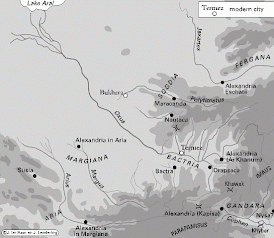
In April 329, the Macedonians had reached the valley of the river Kabul and founded a military base named Alexandria in the Caucasus. The veterans who settled there, felt that they were left behind in a punitive colony, and several insurrections are recorded.
There was no time to rest: the Macedonians started to cross the Hindu Kush mountain range almost immediately. They had been marching through the snow on their way to Gandara, and were to see more snow again now that they were moving to Bactria. The soldiers must have understood that it was necessary: at this stage of the war, everything depended on speed. In the spring, their enemy Artaxerxes V Bessus would certainly block the passes and destroy the countryside; if the Macedonians were to have an easy crossing, they were forced to move across the mountains as soon as possible.
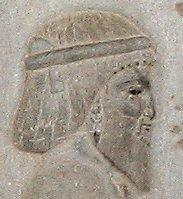
The operation was successful. In May, they surprised the mountain tribes near the Khawak pass and fourteen days later, they captured Drapsaca (modern Konduz) in Bactria. On hearing the news, Bessus' men left their king alone, and he was forced to go to the country north of the river Oxus (the modern Amudar'ya). A few days later, the capital of Bactria, Bactra (Balkh, near modern Mazâr-e Sharîf), was taken, and Alexander appointed Artabazus as satrap. It had been a difficult march, sometimes across glaciers, and without sufficient food; the soldiers had even been forced to eat their pack-animals. But he had succeeded (text).
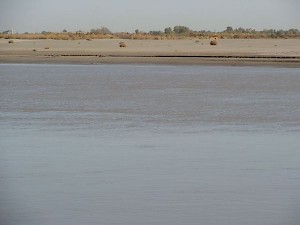
A new terror was waiting for the soldiers: the march to the river Oxus, across 75 kilometer of waterless desert. The Roman author Quintus Curtius Rufus describes the death march (text): it was too hot to travel by day, and the troops - who had suffered from cold only weeks ago - were now forced to walk during the night (which makes a date near the full moon of 1 June plausible). During the advance to the Oxus, one of the most famous incidents of Alexander's life took place: when someone offered him water, he refused it, saying that he wanted to share the hardships of the rank and file. When the army finally reached the river, many soldiers died from uncontrolled drinking.
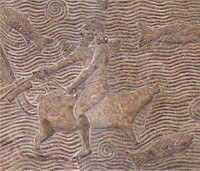
Bessus had tried to prevent the crossing of the Oxus by burning all available ships. However, the Macedonians made rafts. They stuffed animal skins and tents with hay, and five days later, the army was on the other bank in the southeast of what is now called Turkmenistan.
The end of Bessus
The crossing of the Hindu Kush, the desert and the Oxus were impressive deeds and the enemy lost heart. Bessus' courtiers Spitamenes and Datames arrested Artaxerxes V Bessus and handed him over to Ptolemy, Alexander's friend and future biographer.
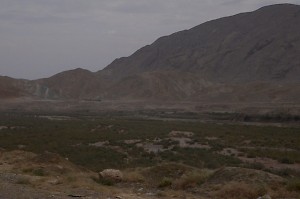
Alexander had Bessus cruelly mutilated: his ears and nose were cut off. This was shocking to the Macedonians, but it was what Alexander had to do as a Persian king who punished a regicide. Two centuries before, Darius I the Great had ordered the same treatment for Phraortes, the last ruler of independent Media. After the mutilation, Alexander handed Bessus over to Darius' brother Oxyathres, ordering that he should bring the rebel to the place where he had killed his master, crucify him and keep the vultures away from the dead body. This was a very gruesome deed: the Zoroastrians believed that the dead must be devoured by birds. It was the Persian equivalent of the Greek denial of burial.
It was not the only atrocious act during this summer. At one moment, the Macedonians attacked a town and murdered all its inhabitants. It is not known why, but later authors tried to explain the fact away: its inhabitants were said to have been descendants of the Milesian priests who had collaborated with the Persians exactly 150 years before. This story is not plausible - why would the Persians have rewarded these people with exile? - but the fact that it was invented, shows that the incident was found to be embarrassing.
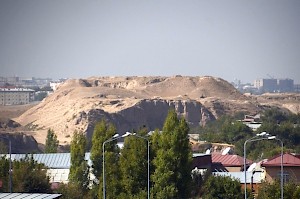
From now on, Alexander was the unchallenged king of Persia, and he ordered his men to continue to march to the northern border of his empire. They must have disliked the steppe country through which they were traveling, but knew that at least the fighting was over - although there were some minor skirmishes. Soon, they reached Nautaca and Maracanda (modern Samarkand).They had reached the satrapy called Sogdia.
Sogdia
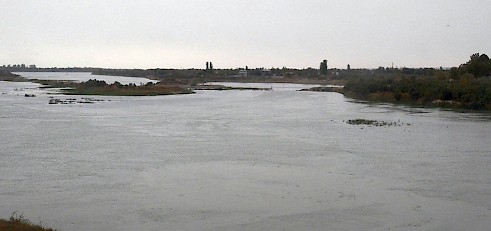
The army proceeded to the river that was locally known as Jaxartes (the modern Syrdar'ya). Alexander identified it with the Araxes, of which his teacher Aristotle of Stagira had said that it had its sources in the Hindu Kush and sent off a branch stream that became the Tanais (Don). Everybody knew that the Tanais was the border between Asia and Europe and therefore, Alexander could claim that he had reached the "end of Asia". In July, he founded a new city, called Alexandria Eschatê, "the furthest Alexandria" (modern Khodzent). This was to be a garrison against the nomadic tribes north of the river, the Sacae. It replaced an older city that the Greeks called "Cyreschata" and may have been called Kurushkatha, "town of Cyrus".
Exactly five years after the battle on the Granicus (according to the Greek calendar), Alexander's triumph seemed complete. It is probable that the foundation of a town near the edge of the earth marked the end of the Deeds of Alexander by his court historian Callisthenes of Olynthus. The Macedonian high command must have been unpleasantly surprised when messengers arrived, telling that the Sogdians were revolting.
The Sogdian revolt
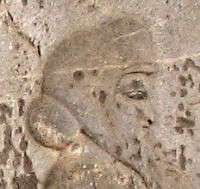
Their leader was the man who had betrayed Bessus, Spitamenes. This is interesting, because the Persian name Spitâmaneh suggests a connection with Zoroastrianism: the founder of this Iranian religion, the legendary prophet Zarathustra, was also called Spitama. It is probable that the invaders had insulted the native population that had initially supported him. One of our sources mentions that a cavalry commander named Stasanor had tried to make an end to the Zoroastrian practice of exposing the dead to the dogs and the vultures, and this may well have been the cause of the Sogdian revolt. Another cause may have been cattle raiding. It is impossible that the invading army did not confiscate cows - the only sin that was condemned explicitly in the Zoroastrian creed.
It marked the beginning of a completely new phase in the war in a dusty steppe country that was unsuited for phalanx operations. The Sogdians - and the Sacae, Massagetes and Dahae who were to join their rebellion - were excellent mounted archers. To these formidable horsemen, the Macedonian Companion cavalry and the phalanx were unequal, and Alexander was forced to reorganize his cavalry. He had to make use of Iranian horsemen, something that he may have been planning for some time. After all, the king of Asia had already appointed Iranians as satraps and had Persian courtiers, so the introduction of native soldiers was only a small step.
The situation was precarious. Nonetheless, Alexander captured seven Sogdian forts and the population suffered the same fate as the Tyrians had suffered: the men were killed and the women sold. During one of the sieges, the Macedonian king was wounded at the neck.
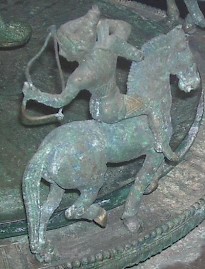
During Alexander's campaign against the seven forts, Spitamenes' horsemen were besieging the garrison at Maracanda, and when the Macedonian soldiers started to march back to the south, the Sacae attacked them in the rear. Alexander returned to the north, sending Greek mercenaries to Maracanda. It was a serious mistake: Spitamenes annihilated the corps. Meanwhile, Alexander crossed the Jaxartes and defeated the Sacae decisively in what looks like his most spectacular victory. Having obtained the surrender of the Sacae, he decided to go south again, covering 290 kilometers in three days with his Companion Cavalry. Maracanda was relieved, but Spitamenes had been able to escape.
Alexander's army was never smaller than in the last months of 329, and the king had to admit that he was unable to continue the war. Yet, he ravaged a part of Sogdia - its peasants would never again support the insurrection because there were no peasants left.
Alexander spent the winter at Bactra, waiting for the reinforcements that Asander and Nearchus, the former satraps of Lydia and Lycia-Pamphylia, were bringing to the east. It is interesting to note that these men were Greek mercenaries, not Macedonians. Alexander had drained Macedonian manpower and it has often been noted that his country was military weak after Alexander's reign.
Counterattack
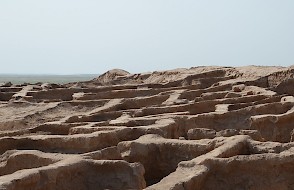
The spring of 328 saw a Macedonian surprise attack on the people along the Upper Oxus; it is likely that Alexander refounded the town that is now known as Ai Khanum in these weeks. Another city, Alexandria on Oxus, has been discovered at Kampyr Tepe.
He returned to the west and divided his army. Two thirds of the phalanx were to defend Bactria; the remainder of his troops was to go to the north and built garrison towns. At this point, our sources become hopelessly confused; even the best narrative, Arrian of Nicomedia's Anabasis, is fragmented, contains doublets and is hard to understand. What seems certain, however, is that Alexander divided his cavalry and light infantry in task forces.
- Artabazus and Coenus were to command an army in the extreme north of Sogdia, deterring the Sacae. This is interesting, because it is likely that Bactrian horsemen were the backbone of this army - proof that Alexander was willing to give the native Iranian population an important role in his empire.
- Alexander's close friend Hephaestion was to oversee the newly founded garrison towns.
- Craterus was to go to the west, where he had to pacify Margiana, the oasis between Bactria/Sogdia and Aria (modern Merv or Mary) in the Kara Kum desert. At all costs, he had to prevent Spitamenes from taking this oasis.
- Alexander, Ptolemy and Perdiccas were to attack the Sogdian mountain settlements in the Gissarskiy (or Hissar) range. People were resettled in new towns.
The campaigns were hard but successful, although Spitamenes was able to carry on his guerrilla war and came dangerously close to the walls of Bactra. Nonetheless, the results were impressive and during the winter, which the reunited armies spent at Nautaca and Maracanda, several neighboring tribes and countries sent ambassadors to conclude treaties (e.g., Chorasmia). In December, the news arrived that Spitamenes' allies had left him; the Macedonian officer Coenus sent the rebel's head to Nautaca.
Clitus
During the winter, a tragic accident took place. During a dinner, many courtiers were flattering the conquering hero, who had almost won the war in the desert. Some called him the son of Zeus Ammon and belittled Alexander's human father Philip, others made jokes about the commanders who had been defeated and killed by Spitamenes. This was more than Clitus, a cavalry commander who had served under Philip and knew the dead commanders, could stomach. He started to praise Philip. Alexander felt offended, and in a drunken rage, he pushed aside his bodyguards Ptolemy and Perdiccas and run a lance through Clitus, who died on the spot.
When Alexander was sober again, he knew that he had overreacted and understood that he had made one of the greatest mistakes of his life. As his teacher Aristotle had said:
One who sins when drunk, must be punished twice: once for sinning, and once for being drunk.
For three days, Alexander considered suicide and he came close to death indeed, because he refused to drink. However, he decided to accept life as it was again. What may have helped was that a philosopher named Anaxarchus of Abdera, told him - in true aristotelian fashion - that the king is (like Zeus) justice impersonated, and can therefore not act badly. This may have been comfortable to Alexander, but set a new standard of flattery. From now on, hardly anybody dared to correct Alexander any more.
Mopping up
The next year, 327, saw mopping-up operations. Two of Alexander's most spectacular achievements are the capture of the Sogdian Rock (text) and the Rock of Sisimithres. This man deserves some attention, because our sources mention that he had two sons by his mother. The Greeks and Macedonians were shocked to hear about this, but the next-of-kin marriage was a normal Zoroastrian practice, called hvaetvadatha.
Alexander made an end to this custom. It is interesting to note that this caused no rebellion. Almost two years before, Stasanor's attempt to stop the practice of exposing the dead had triggered the revolt of Spitamenes. But now, there were no more people left to rebel: the Bactrian and Sogdian aristocrats had been defeated, the populace had been reduced to serfdom and the neighboring nomad tribes had concluded treaties. Besides, an enormous garrison was left in Bactria and Sogdia: at least 11,000 men.
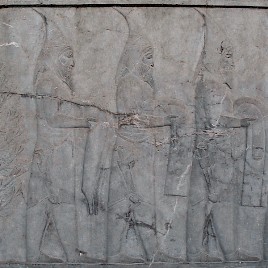
In the summer, the armies united at Bactra, which was the scene of several important events that gave an idea of Alexander's plans for the future. In the first place, he ordered that 30,000 young Iranians were to be formed into a phalanx. This suggests that the Bactrian horsemen of Artabazus had been reliable, and it proves that Alexander wanted to reinforce his army with natives. This was to cause great tensions among the Macedonian troops, as we will see below. Local cavalry units were also added to the Macedonian army; the mounted archers of the Dahae were to play an important role in the following years.
In the second place, Alexander married to Roxane, the daughter of one of the Sogdian leaders, who had been captured after the fall of the Sogdian Rock (text). It was a political necessity, intended to play a role in the pacification of Bactria and Sogdia. But it was heartless, too: after all, Alexander already had a Persian mistress, Barsine, who had recently given birth to a son (called Heracles). She was sent away, or decided to leave. The marriage to Roxane was also an insult to Barsine's father Artabazus, who had played a very important role during the past three years in bringing over the Persian elite to Alexander's side, the reduction of the Arian revolt and during the war against Spitamenes. He had deserved better.
Proskynesis
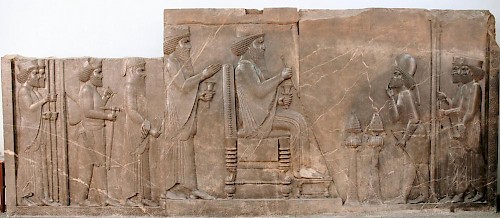
The third and most important event was Alexander's attempt to introduce proskynesis, the courteous way to great one's superior in Persia. It involved blown kisses and bows. This was not accepted by the Macedonians and Greeks, who thought that it might be fitting for an Asian to express his obedience like this, but not for a free European. This was not the way to greet a mortal. On the other hand, if the many Persians at Alexander's court saw that the Macedonians and Greeks did not greet their king properly, they might wonder whether he was a real king - therefore, the introduction of proskynesis was a necessity.
It seems that Alexander first introduced the custom during a drinking party in Bactra with his closest friends. Many people did what was demanded, but Alexander's Greek court historian Callisthenes of Olynthus refused. It is not exactly clear what happened next. Several authors have claimed that Alexander did not make a second attempt to introduce proskynesis; but it was a custom at the courts of his successors (and we still have the custom to bow for kings and queens), and it may be argued that the custom was introduced successfully at a later stage. Maybe, this happened after Alexander had executed Callisthenes, but again, the evidence is far from clear.
A fourth incident deserves to be mentioned, also related to the introduction of Persian court rituals. During a hunt, the Persian king was supposed to be the first to strike at the animal. However, one of Alexander's pages had speared a boar to death; he had probably saved his king's life, but Alexander had whipped the boy. He and several others decided to kill Alexander in his bed, but the king was saved miraculously: he was too drunk to return to his tent.
It is remarkable that the insulted boy found fellow-conspirators, unless there were more people who were discontent with the orientalization of Alexander's court. The plot was discovered and many others were found guilty - Callisthenes was one of the victims. They were all executed.
The introduction of Iranians to the army, the marriage to a Sogdian princess, proskynesis, and the execution of the pages and their accomplishes: all these incidents must have served to estrange Alexander from the Macedonians and Greeks in his army. Within a year, they would be in open revolt against their king.